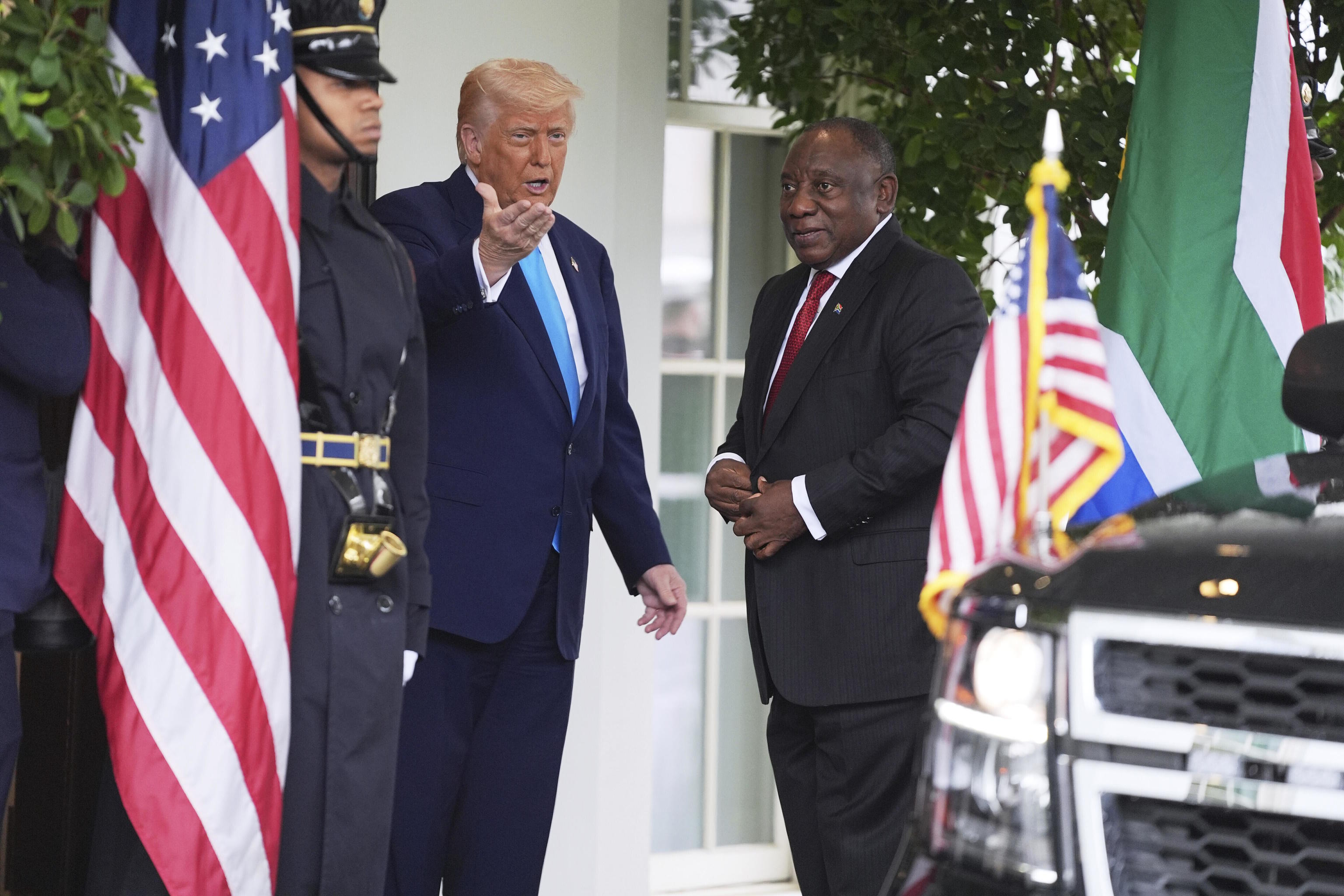When Donald Trump and Volodymyr Zelensky resolved their differences by shouting at the White House, many analysts denounced it as not just a heated argument, but a trap. The Administration and its supporters denied it, accusing the Ukrainian of disrespecting the country, the institution, and the president. However, this Wednesday, Trump demonstrated that the Oval Office has become a place for ambushes, shows, and what he previously called: "good minutes of television".
Trump welcomed South African President Cyril Ramaphosa. Although the first few minutes were extremely cordial, filled with praise for the politician and his country, with laughter, jokes, the meeting quickly turned into a trap. Trump wanted to corner Ramaphosa and he did so by turning off the lights in the world's most famous office and playing a video for several minutes with accusations against white farmers and cases of black politicians calling for "killing the boers" or instigating actions against the white minority. "It's like a reverse Apartheid," he snapped at one point.
In a matter of minutes, chaos ensued, with Trump arguing with journalists in anger, Ramaphosa trying to explain that the images on the screen did not reflect his Government's position, and Trump ignoring his explanations and showing press clippings from recent days "talking about executions" and demanding the arrest of those involved in chants against the boers. "It's very easy, arrest them quickly."
With the first mention of "genocide," Ramaphosa did not take the bait. With the second, he said that instead of repeating arguments that everyone had surely heard, he urged the president to listen to the white men who were with him in the delegation, including very famous golfers that Trump knows and admires, such as Ernie Els or Retief Goosen.
But nothing worked. Trump played the prepared video, criticized his passivity and Government's complicity, and did not allow the African politician, visibly uncomfortable during the video but surprisingly calm during the rest of the incident, to develop his arguments. Such as the fact that his Agriculture Minister is white. "I have never seen anything like it, it's horrible," Trump said about a scene in the video showing Afrikaners in a cemetery lining up their cars to pay tribute to their deceased.
Unlike Zelensky, Ramaphosa did not fully fall into the trap, although he skirted it when, in one of the questions from journalists to Trump about the controversial plane that Qatar could give him, he joked saying that unfortunately he did not have "planes to give". However, Trump took it well.
The South African maintained his composure, did not raise his voice, did not lose his temper. Aware that his words would not be enough, he brought white men in his delegation, and Trump listened attentively to them. To the golfers and the billionaire Johann Rupert. They did not defend the Government or its policies. They did not address the issue of the Afrikaners, but their presence there, alongside the president, served to calm Trump, ease the situation, and led to a reasonably good ending, with Trump once again praising his guest.
Ramaphosa came with the remote hope of being able to focus the conversation on tariffs and trade relations. "This visit provides a platform to restore the strategic relationship between both countries," a statement issued by the South African presidency before the trip pointed out. The African leader even brought a specific proposal because, he said, "commercial relations are the most important. That's what brought us here. We want to leave the United States with an excellent trade agreement," specifically reaching out to Elon Musk's companies.
But what Trump had in mind was very different. He wants the South African Government to classify farm attacks as a serious crime and make it a political priority. His team privately explained that they would push for a clear, official condemnation of the chant "Kill the boers," a classic against apartheid that over the decades has become controversial and divisive, to the point that the ruling party has distanced itself from it.
Tension had been high for weeks. Elon Musk, born in South Africa, has influenced the president and his team's perception of the situation in South Africa significantly. Both privately and in posts on his social network and interviews. On February 7, Trump issued an executive order cutting all U.S. funding to South Africa, alleging what he described as "anti-white domestic policies" and an anti-American foreign policy. In March, he expelled the South African ambassador. He has started a program to grant refugee status to Afrikaners (while withdrawing or denying it to Haitians, Venezuelans, or South Sudanese) and has threatened to boycott the G-20 meetings scheduled to be held this year in South Africa, saying that not only will he not attend, but neither will his ministers.
In January, Ramaphosa enacted a law allowing the government to expropriate private land without compensation when deemed in the public interest. His Government claims it aims to compensate for the consequences of apartheid, but Trump has sided with white landowners, going as far as reproaching the media for not paying attention to what he considers "a genocide." In South Africa, he stated, "white farmers are being brutally murdered, and their lands are being confiscated. Turns out they are white. But whether they are white or black, it doesn't matter to me."
Besides that sensitive issue, particularly among conservative and nationalist circles in the U.S., in the previous December, South Africa filed a lawsuit with the International Criminal Court, alleging that Israel's military operations in Gaza constitute acts of genocide. An action that American diplomacy, still under Joe Biden, tried unsuccessfully to neutralize.
